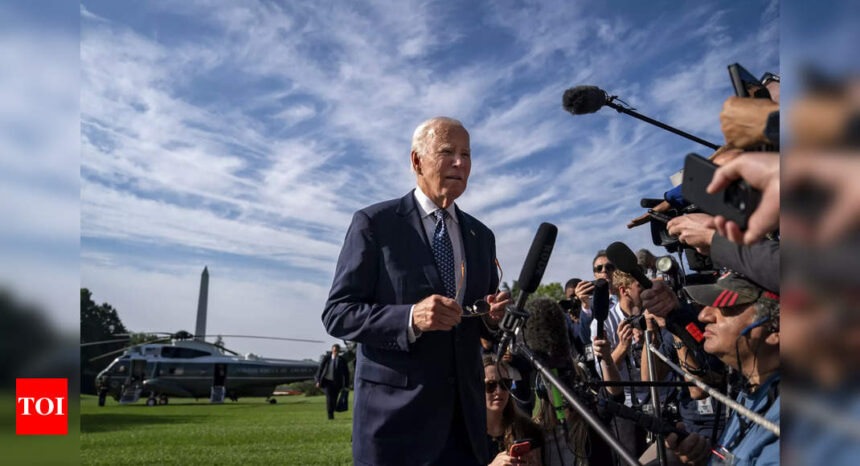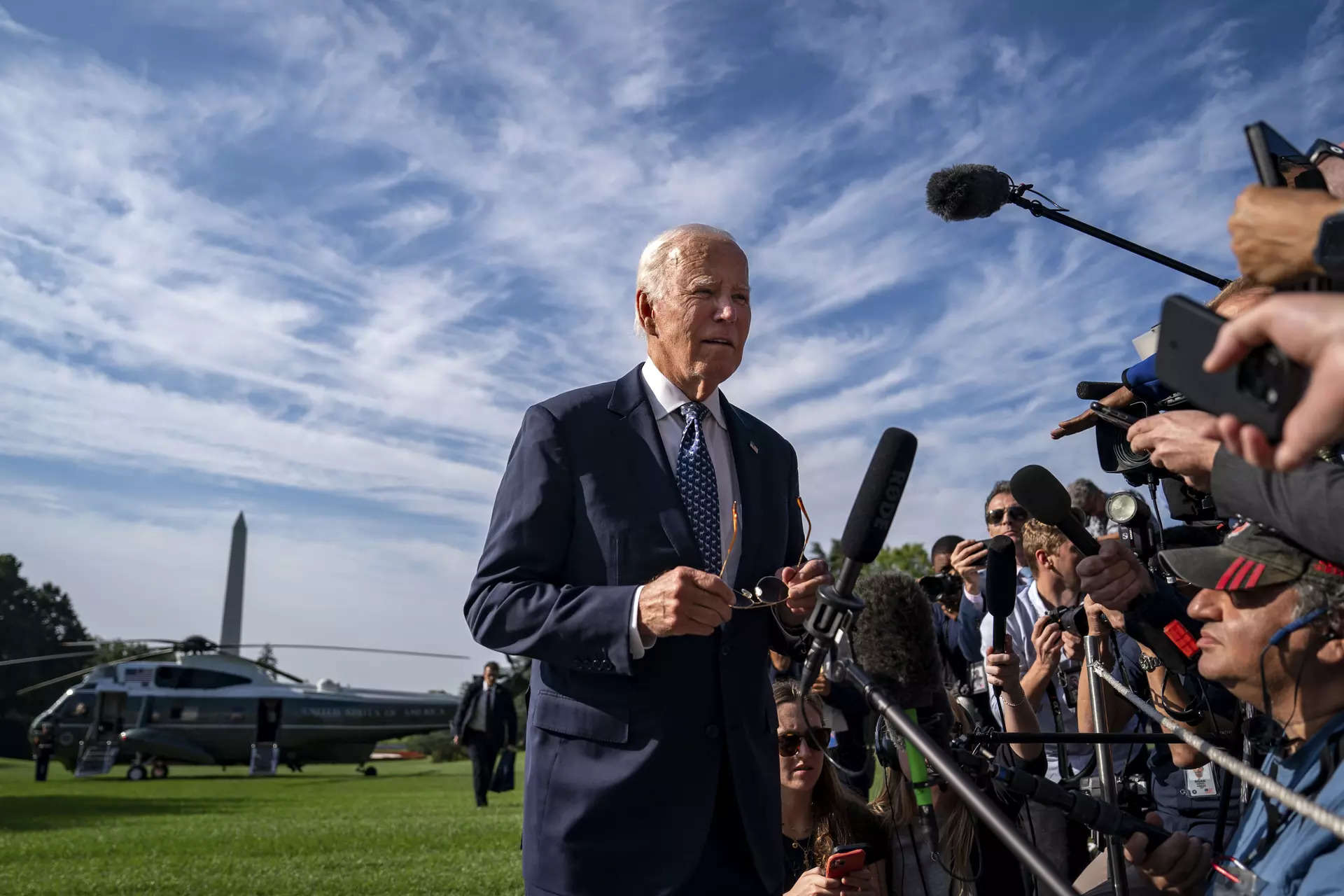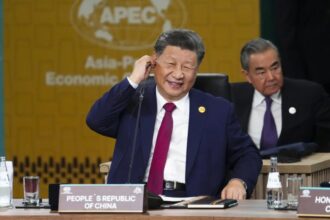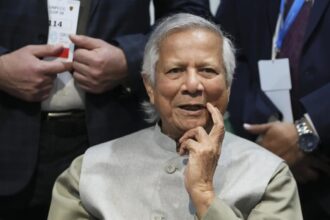WASHINGTON: President Joe Biden issued a one-word rebuke Monday to Prime Minister Benjamin Netanyahu’s commitment to reaching a cease-fire and hostage release deal, the latest iteration of the White House’s monthslong effort to cajole and censure the Israeli leader.
As he exited Marine One on the White House lawn on the way to a meeting of his national security team, Biden was asked a series of questions by waiting reporters about whether Netanyahu was doing enough to achieve a deal to get the hostages back.The president responded simply: “no.”
But as the advisers briefed Biden and Vice President Kamala Harris, whose every utterance on the Israel-Hamas war is being examined for evidence that she is ready to shift administration policy, it became clear that far more than just Netanyahu’s own political calculations was getting in the way of a preliminary hostage exchange and six-week cease-fire.
While administration officials say that they have locked down 90% of the 18-paragraph-long preliminary accord, Hamas has still not approved a final list of which hostages would be released and who would be released in a first phase. In return, Israel would release a large number of Hamas fighters and other prisoners.
Among those who had been expected to be freed were several of the six Israeli and American hostages who were executed over the weekend, apparently after their captors feared that an Israeli rescue operation was underway. One of them was Hersh Goldberg-Polin, 23, a dual American and Israeli citizen who had lost an arm trying to protect others during the Oct. 7 terror attack that precipitated the Israel-Hamas war.
Hamas has demanded that all Israeli forces be withdrawn from the Philadelphi Corridor, a narrow strip of land, less than 9 miles long, on the border between the Gaza Strip and Egypt. Netanyahu has said Israeli troops must remain in the corridor to prevent the movement of weapons and ammunition to Hamas.
The draft agreement calls for a major reduction in Israeli forces in the corridor during the first phase of the cease-fire and full withdrawal thereafter. Israeli government negotiators have agreed to the phased withdrawal, but Netanyahu has backed away from that part of the deal, triggering an open dispute with his own defense minister, Yoav Gallant.
“It is too late for the hostages who were murdered in cold blood,” Gallant said Sunday, declaring that Netanyahu had to drop his insistence on the presence of troops in the corridor. “We must bring back the hostages that are still being held by Hamas.”
White House officials are considering pushing another “final” draft of the agreement in coming days, after the region has cooled off from the execution of the hostages.
There have been other final drafts. A week and a half ago, White House and State Department officials said there would be a meeting of the negotiators, except for Hamas, to approve a final accord. That meeting never happened after Yahya Sinwar, the Hamas leader, rejected elements of it, and Netanyahu insisted on the continued military presence in the corridor.
After the Situation Room meeting Monday, Biden said little about his strategy over the next days and weeks, including whether there would be a presentation of another final draft. “We’re in the middle of negotiations,” Biden said to reporters after the meeting, on the way to a campaign event with Harris in Pennsylvania.
Biden ignored a question about Netanyahu’s defiant stance during a news conference in Israel on Monday, when the prime minister questioned what message it would send to Hamas after the deaths of the hostages if Israel let up in the fighting. “Slay hostages and you’ll get concessions?” the prime minister said.
Biden would only say that “we’re still in negotiations — not with him, but with my colleagues from Qatar and Egypt.”
Harris did not talk about the strategy. At the Democratic National Convention two weeks ago, she strongly backed Israel, while saying more had to be done to relieve the sufferings of the Palestinian people. But she has been careful to hew closely to the administration’s current policy and deflected calls from the progressive wing of the party to cut off at least some weapons shipments to Israel, a step the British took Monday.
The British decision puts its government and Washington at odds on the tactics for dealing with Netanyahu. Washington suspended export of 2,000-pound bombs earlier this year, saying their use could lead to wide civilian casualties and were not needed by the Israelis. But Britain has gone further. David Lammy, Britain’s foreign secretary, said that a legal review concluded there was “clear risk” that a number of weapons would be used in ways that would breach international law. Biden and Harris have not reached a similar conclusion.
Still, Biden and Netanyahu have clashed often in the past 10 months and with particular intensity since the spring. White House officials thought they were near a hostage deal in mid-July, one of several moments in which they believed — and Biden publicly declared — that the negotiations mediated by the United States, Qatar and Egypt would result in a temporary cease-fire, with hopes of a longer-lasting one.
Other obstacles to a deal have come from Sinwar, who has been engaged in the negotiations remotely as he hides out, presumably underground in Gaza. Israeli military and intelligence officials, with American help, are hunting for Sinwar, considered the lead architect of the Oct. 7 attack that killed roughly 1,100 Israelis.
As he exited Marine One on the White House lawn on the way to a meeting of his national security team, Biden was asked a series of questions by waiting reporters about whether Netanyahu was doing enough to achieve a deal to get the hostages back.The president responded simply: “no.”
But as the advisers briefed Biden and Vice President Kamala Harris, whose every utterance on the Israel-Hamas war is being examined for evidence that she is ready to shift administration policy, it became clear that far more than just Netanyahu’s own political calculations was getting in the way of a preliminary hostage exchange and six-week cease-fire.
While administration officials say that they have locked down 90% of the 18-paragraph-long preliminary accord, Hamas has still not approved a final list of which hostages would be released and who would be released in a first phase. In return, Israel would release a large number of Hamas fighters and other prisoners.
Among those who had been expected to be freed were several of the six Israeli and American hostages who were executed over the weekend, apparently after their captors feared that an Israeli rescue operation was underway. One of them was Hersh Goldberg-Polin, 23, a dual American and Israeli citizen who had lost an arm trying to protect others during the Oct. 7 terror attack that precipitated the Israel-Hamas war.
Hamas has demanded that all Israeli forces be withdrawn from the Philadelphi Corridor, a narrow strip of land, less than 9 miles long, on the border between the Gaza Strip and Egypt. Netanyahu has said Israeli troops must remain in the corridor to prevent the movement of weapons and ammunition to Hamas.
The draft agreement calls for a major reduction in Israeli forces in the corridor during the first phase of the cease-fire and full withdrawal thereafter. Israeli government negotiators have agreed to the phased withdrawal, but Netanyahu has backed away from that part of the deal, triggering an open dispute with his own defense minister, Yoav Gallant.
“It is too late for the hostages who were murdered in cold blood,” Gallant said Sunday, declaring that Netanyahu had to drop his insistence on the presence of troops in the corridor. “We must bring back the hostages that are still being held by Hamas.”
White House officials are considering pushing another “final” draft of the agreement in coming days, after the region has cooled off from the execution of the hostages.
There have been other final drafts. A week and a half ago, White House and State Department officials said there would be a meeting of the negotiators, except for Hamas, to approve a final accord. That meeting never happened after Yahya Sinwar, the Hamas leader, rejected elements of it, and Netanyahu insisted on the continued military presence in the corridor.
After the Situation Room meeting Monday, Biden said little about his strategy over the next days and weeks, including whether there would be a presentation of another final draft. “We’re in the middle of negotiations,” Biden said to reporters after the meeting, on the way to a campaign event with Harris in Pennsylvania.
Biden ignored a question about Netanyahu’s defiant stance during a news conference in Israel on Monday, when the prime minister questioned what message it would send to Hamas after the deaths of the hostages if Israel let up in the fighting. “Slay hostages and you’ll get concessions?” the prime minister said.
Biden would only say that “we’re still in negotiations — not with him, but with my colleagues from Qatar and Egypt.”
Harris did not talk about the strategy. At the Democratic National Convention two weeks ago, she strongly backed Israel, while saying more had to be done to relieve the sufferings of the Palestinian people. But she has been careful to hew closely to the administration’s current policy and deflected calls from the progressive wing of the party to cut off at least some weapons shipments to Israel, a step the British took Monday.
The British decision puts its government and Washington at odds on the tactics for dealing with Netanyahu. Washington suspended export of 2,000-pound bombs earlier this year, saying their use could lead to wide civilian casualties and were not needed by the Israelis. But Britain has gone further. David Lammy, Britain’s foreign secretary, said that a legal review concluded there was “clear risk” that a number of weapons would be used in ways that would breach international law. Biden and Harris have not reached a similar conclusion.
Still, Biden and Netanyahu have clashed often in the past 10 months and with particular intensity since the spring. White House officials thought they were near a hostage deal in mid-July, one of several moments in which they believed — and Biden publicly declared — that the negotiations mediated by the United States, Qatar and Egypt would result in a temporary cease-fire, with hopes of a longer-lasting one.
Other obstacles to a deal have come from Sinwar, who has been engaged in the negotiations remotely as he hides out, presumably underground in Gaza. Israeli military and intelligence officials, with American help, are hunting for Sinwar, considered the lead architect of the Oct. 7 attack that killed roughly 1,100 Israelis.
Source : Times of India









